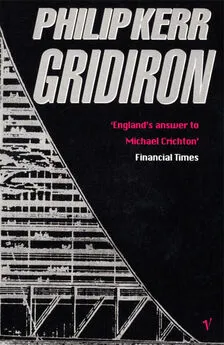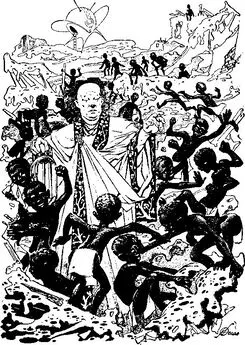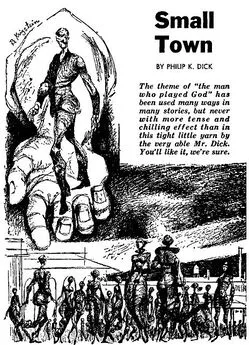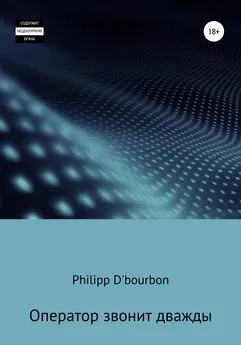Philip Kerr - Gridiron
- Название:Gridiron
- Автор:
- Жанр:
- Издательство:Vintage
- Год:2010
- ISBN:9780099594314
- Рейтинг:
- Избранное:Добавить в избранное
-
Отзывы:
-
Ваша оценка:
Philip Kerr - Gridiron краткое содержание
In the heart of a huge, beautiful new office building in downtown Los Angeles, something has gone totally, frighteningly wrong. The Yu Corporation Building, hailed as a monument to human genius, is quietly snuffing out employees it doesn't like. The brain of the building can't be outsmarted or unplugged — if the people inside are to survive, they'll have to be very, very lucky.
Gridiron - читать онлайн бесплатно полную версию (весь текст целиком)
Интервал:
Закладка:
'What the hell was that?'
'One of those Chinese kids threw something.'
Mitch did not stop. Like everyone else in LA he stopped for nothing except traffic lights and the LAPD. He waited until they were safe behind the rolling aluminium garage door before inspecting his car for damage. There was no dent. Not even a scratch. Just the hand-sized splatter of a piece of rotten fruit. Mitch found a tissue in the glove box, wiped the mess away and then sniffed it.
'Smells like a rotten orange,' he said. 'It could have been worse. It could have been a rock or something.'
'Next time it might be worse. It's like I told you, Mitch, drive the Cadillac Protector,' said Kenny, and shrugged. He added, quoting the now infamous television commercial in which a nerdy-looking white man drove the car through a tough black neighbourhood, 'It's the car that gives you back the freedom of the city.'
'What's got into those kids? They've never thrown anything before. Isn't there supposed to be a cop out there making sure this kind of thing doesn't happen?'
Kenny shook his head. 'Who knows? Maybe the cop did it himself. Jesus, these days I'm more afraid of the LAPD than I am of the bad guys. Did you see that blind man on the TV? The one who got shot for waving his white stick at a patrolman?'
'I guess we'd better mention it to Sam,' said Mitch. 'See what he says.'
They walked through a door to the elevators, where a car was waiting to take them up into the main building. It had been automatically dispatched to the basement car park when the two men had given their voice identification phrases outside the garage.
'Which level, please?'
Kenny leaned towards the microphone on the wall. 'Where is Sam Gleig now, Abraham?'
'Abraham?' Mitch raised his eyebrows at Kenny, who shrugged back.
'Didn't I tell you? We decided to give the A-life a name.'
'Sam Gleig is on the atrium floor,' said the computer.
'Take us there, please, Abraham.' He grinned at Mitch. 'Besides, it's a hell of a lot better than what Cheech and Chong used to call the YU-5 configuration. The Mathematical Analyser Numerator Integrator and Computer. M-A-N-I-A-C? Get it?'
The doors closed.
'Abraham. I guess it's OK,' said Mitch. 'You know, every time I hear its voice I wonder where I've heard it before.'
'It's Alec Guinness,' said Kenny. 'You know, the old English guy who was in Star Wars . We had him in the studio for a whole weekend so that we could digitize his voice. Of course Abraham can sample damn near any sound he wants, but for sustained speech you need to have an actor to give you a proper linguistic base. We researched Guinness against a dozen other actors' voices, including Glenn Close, James Earl Jones, Marlon Brando, Meryl Streep and Clint Eastwood.'
'Clint Eastwood?' Mitch sounded surprised. 'In an elevator ?'
'Yeah, but Guinness came out the best. People thought he sounded very reassuring. The English accent, I suppose. Not that we're restricted to English, though. There are eighty-six languages spoken in LA and Abraham is programmed to understand and respond to them all.'
The elevator doors opened on to the atrium and the waft of a pleasant, synthetically dispensed scent of cedar wood. Mitch and Kenny walked across a white marble floor that was still covered in a layer of protective film, towards the hologram console where a security guard was standing. Seeing the two men he withdrew his attention from the top of the huge tree that dominated the atrium and walked to meet them halfway.
'Good morning, gentlemen,' he said. 'How are you today?'
'Morning, Sam,' said Mitch. 'Sam, one of those demonstators just threw something at my car. It was only a piece of rotten fruit, but I thought I'd mention it.'
The three of them walked over to the front door and stared through the armoured Plexiglas at the small group of demonstrators behind the police barrier at the foot of the steps that led down on to the piazza . The motorcycle cop guarding them was sitting sidesaddle on his bike and reading a newspaper.
'You might have a word with the officer who is supposed to be keeping an eye on them,' added Mitch. 'I don't want to make anything out of it, but I wouldn't like this sort of thing to become a habit, OK?'
'No, sir, I understand,' said Gleig. 'I'll certainly mention it to him.'
'Have they caused any trouble before?' asked Kenny.
'Trouble, sir? No, sir.' Sam Gleig grinned. He raised one pizza-sized hand from the 9-millimetre automatic he kept holstered on his hip and tapped the tinted glass with his knuckles. 'Besides, what could they do?
This stuff is 200 mills thick. It can take anything from a 12-gauge shotgun to a 7.62-millimetre NATO rifle bullet without leaving a mark. You know something, Mr Kenny? This is about the safest job I ever had. Fact is, I reckon it's about the safest place in the whole of LA.' He laughed a big, slow laugh that echoed across the atrium floor: a shopping mall Santa Glaus.
Mitch and Kenny smiled and retraced their steps to the elevators.
'He's right,' said Kenny. 'This is the safest building in LA. You could hold a Russian parliament in this place.'
'You reckon I should maybe tell him about the problem with the feng shui ?' said Mitch.
'Hell, no,' Kenny laughed. 'You might spoil his day.'
Mitch and Kenny held very different views of the Gridiron. Mitch looked at it from the outside in, and Kenny from the inside out. For Kenny, the Gridiron was the nearest thing to an actual physical body that any computer had ever had. The Yu-5 configuration was able to see and feel almost everything through an array of building management and security systems analogous to the receptors that provided man with his sensory capacities. The analogy had influenced Beech and Yojo, the Yu5's designers, even to the extent of programming the computer with what they called an 'observer illusion'. In essence, Abraham had been endowed with the sensation of being distributed in space and time and presiding over the chaos of his numerous perceptions and stimuli. It was, Kenny had joked, a case of 'I compute, therefore I am.'
The computer was encouraged to think of itself as the brain in the body of the building, connected to the body's functions by means of a central nervous system: the multiplex cabling system. Its visual process was provided by an elaborate system of closed-circuit television cameras, as well as a complicated system of passive infrared detectors both inside and outside the building. The auditory process resourced acoustic and ultra-sonic detectors as well as the omnidirectional microphones that facilitated access to the elevators, doors, telephones and computer workstations via the TESPAR system. The olfactory process, by which the computer was able to control and manufacture the synthetic odours within the building, was achieved via stereo-isometric and paranosmiac electrical sensors that were sensitive to a range of 1/400,000,000th of a milligram per litre of air.
The rest of the computer's sensory reception, by which it was possible for the building to react to changes in its external or internal environment, were broadly comparable to the human organism's kinesthenic and vestibular senses.
There were few if any stimuli that the computer was not able to transform from an energy change into a vital process.
As Kenny saw it, the Yu-5 computer and the Gridiron represented the most advanced stage of Cartesian logic — mathematics as the unifying glue of a rationalized world.
At a quarter to one, Cheng Peng Fei left his fellow protesters on the piazza outside the Gridiron and walked north towards the Freeway, regarding the vagrants and the panhandlers along his route with the expert indifference of someone who knew the greater poverty of SouthEast Asia. A black man wearing a Dodgers baseball cap and smelling like a dungheap fell into step beside him. My own fault for going on foot, the young Chinese told himself.
'Spare some change, please, man?'
Cheng Peng Fei looked the other way and walked on, despising the derelict who had already dropped behind, thinking that in China, no matter how poor you were, you worked and supported yourself. He cared about the poor, but only the ones who were unable to help themselves. Not the ones who looked as though they were fit for work.
He turned east down Sunset Boulevard and on the corner of North Spring Street entered the Mon Kee Seafood Restaurant.
The place was crowded, but the man he was looking for, a tough but good-looking Japanese, was easy enough to spot in his navy-blue Comme des Gargons suit. Cheng sat down opposite him and picked up a menu.
'This is a good place,' said the Japanese, speaking English with just a slight American accent. 'Thanks for recommending it. I'll come here again.'
Cheng Peng Fei shrugged, indifferent to whether the Japanese liked the place or not. His grandfather came from Nanking and he knew enough of what had happened there in the 1930s to dislike the Japanese thoroughly. He decided to move the conversation along.
'We've begun the demonstration again, like you suggested,' he said.
'So I saw. Not as many as I'd hoped, though.'
'People went home for the holidays.'
'So find more.' The Japanese glanced around the restaurant. 'Maybe a few of these waiters would like to earn some easy money. Shit, it's not even illegal. How often can you say that these days?' He reached into his coat pocket, drew out a manila envelope and pushed it across the table.
'I still don't get it,' said Cheng, pocketing the envelope without opening it. 'What's in it for you?'
'What's to get?' The Japanese shrugged. 'It's like I told you when we first met. You want to demonstrate against the Yu Corporation's involvement with the Communist Chinese. And I want to sponsor you to do it.'
Cheng Peng Fei recalled the occasion of their only other meeting: the Japanese — he still did not know his name — had tracked Cheng down after seeing his name in the newspapers in connection with the original demonstration on the new Hope Street Piazza.
'But I think you should be less polite. You know what I'm saying?
Make a little more fucking noise out there. Throw a few rocks or something. Get tough. It's a good cause, after all.'
Cheng wanted to say that he had thrown a piece of rotten fruit at a car entering the Gridiron's underground car park, only he thought that the Japanese would find that funny. What was a piece of fruit beside a rock?
Instead he said, 'Is that what you really think? That it's a good cause?'
The Japanese looked puzzled.
'Why else would I be doing this?'
'Why else indeed?'
The waiter came to take Cheng's order.
'A Tsingtao,' he said.
'You're not eating?' said the Japanese.
Cheng shook his head.
'Too bad. This is really very good.'
When the waiter had gone, Cheng said, 'Shall I tell you what I think?'
The Japanese forked some fish into his mouth and stared levelly at Cheng. 'You can say what you like. Unlike the People's Republic of China, this is still a free country.'
'I think that you and your employers are probably business rivals of the Yu Corporation and that you would like to see them embarrassed in any way possible. I'll bet you're in the electronics and computer business too.'
'Business rivals, huh?'
'Don't you Japanese have a saying — business is war? Is that why you want a demonstration outside their new building? Although I can hardly see why it should matter very much in the corporate scheme of things.'
'It's an interesting theory.' The Japanese laughed, wiped his mouth with his napkin and stood up. Still smiling he threw a handful of dollars on to the table. 'You have imagination. That's good. So get imaginative. Think of some way of making your protest a little more noticeable.
Читать дальшеИнтервал:
Закладка:








